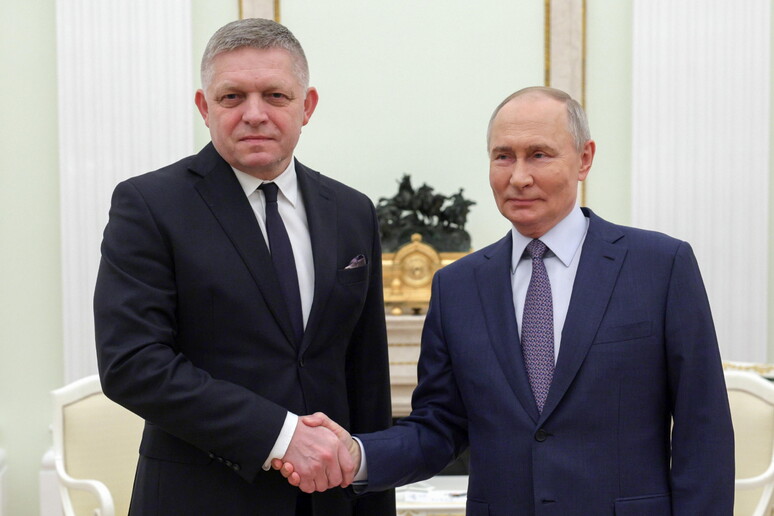di Anna Lisa Rapanà
"We want to end the war, not freeze
it." We are only a few days away from the beginning of 2025,
which will immediately introduce several novelties on the
international political level, starting of course with Donald
Trump's return to the White House, but it is Vladimir Putin who
in these hours seems to want to dictate the line for the new
year and to unravel one of the knots that remain most tangled:
that of the war in Ukraine with its disruptive effect since
Putin himself announced in February 2022 his "special military
operation" by invading the neighboring country. Nearly three
years and tens of thousands of deaths later, the Russian
president said Moscow now wants to end the conflict, not just
freeze it. Thus surpassing, in words, Donald Trump's infamous
plan that seems to be aiming at just that. To end the war Putin
also proposes a physical place to negotiate: Slovakia, led by
Prime Minister Robert Fico, who in recent days met with the
Russian president at the Kremlin despite a chorus of criticism
and misgivings expressed by several countries, including EU
partners, offering precisely to host the talks. Option, Putin
explained while responding to reporters, which is fine with
Moscow. Moscow is fine with it because it now looks at the
border from a position of strength, the same position that
allows the Kremlin to avoid responding to outraged reactions to
the attack launched in Ukraine in the early hours of Christmas
morning: more than 170 missiles and drones, one death, and
damage to the electrical infrastructure that threatens to
severely harm the Ukrainian civilian population in precisely the
coldest weeks of the year. For U.S. President Joe Biden, this
was an "outrageous" act. That is why he let it be known that he
called for accelerating the delivery of weapons from Washington
to Kiev in these last days of his presidency. Putin, however,
insists, saying that among the resolutions for 2025 is to carry
out "all the objectives of the special military operation" and
thus achieve "success on the front line." Then the warning: "We
always respond in a mirror manner. They use certain weapons
against us, we use the same ones," he warned, saying he was
ready to use the Oreshnik super missile again "if necessary."
Still in the past few hours Ukrainian President Voldymyr
Zelensky for his part had assured that "Ukraine is doing
everything possible so that 2025 becomes a year of just and
lasting peace for our country and the whole world." And the
admissions in recent weeks about the difficulties at the front
and, above all, about the fact that on the military level it is
now necessary to give up retaking Donbass and Crimea open that
chink into which a more substantial attempt to bring the parties
back to a negotiating table could slip. Putin's words were
preceded by those of his foreign minister, Serghei Lavrov, among
others: "A ceasefire in Ukraine at this point would lead to
nothing, while reliable agreements are needed," said the Russian
diplomatic chief, who appeared possibilistic about a dialogue
with the incoming Trump administration: "If the signals coming
from the new team in Washington to restore the dialogue
interrupted by the U.S. after the start of the special military
operation are serious, we will obviously respond to them. The
dialogue was interrupted by the Americans, so they should take
the first step." But on one condition: the hope that the new
White House "will understand the reasons that led to the war in
Ukraine," Lavrov hoped.
ALL RIGHTS RESERVED © Copyright ANSA





